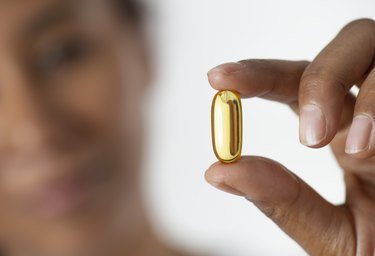
The "sunshine vitamin" is best known for supporting bone health, but studies show that there's an association between depression and vitamin D deficiency.
But that's not to say that not getting enough vitamin D causes depression — or that popping a supplement can treat the condition. Mental and physical health conditions can be as individualistic as fingerprints, and any link between the vitamin and mental health is far more complex than a cause-and-effect relationship.
Video of the Day
Video of the Day
There's much that still remains to be understood about the mood-related effects of vitamin D. Here's what you need to know.
What Is Vitamin D?
Despite its name, vitamin D is a type of hormone, not a vitamin, according to the Hormone Health Network.
Vitamin D is associated with many key health functions. For instance, vitamin D helps with calcium absorption, which leads to bone health, according to the Mayo Clinic. Vitamin D also plays a role in the immune system and brain cell activity, per the Mayo Clinic.
The key is to get the right amount of this vitamin: Too much vitamin D, and you can experience kidney stones, decreased appetite and weakness, per the Mayo Clinic. But low levels of vitamin D can lead to aching bones and muscle weakness, according to the Cleveland Clinic.
Foods, particularly fatty fish like mackerel and fortified foods like milk, can be a source of vitamin D, but up to 90 percent of the sunshine vitamin is absorbed through exposure to the sun, according to a June 2019 article published in StatPearls.
Getting vitamin D from the sun isn't always an easy task: weather conditions, such as dreary gray days, prevent a person from absorbing vitamin D from sunshine, per the Office of Dietary Supplements (ODS). Older people and people with darker skin lower the amount of vitamin D your skin makes, according to the Cleveland Clinic.
And, because windows get in the way of vitamin D absorption, people who are housebound or don't get outside a lot can be deficient in this vitamin.
Related Reading
Vitamin D and Depression
Here's what we know about the connection between vitamin D and depression: The sunshine vitamin is important for your brain, according to the ODS.
And, there are many large studies that show a relationship between low levels of vitamin D and risk of depression, according to a 2017 literature review in Neuropsychiatry.
One study, for instance, examined vitamin D levels of people who were hospitalized for a depressive episode. It found that people with a vitamin D deficiency experienced more symptoms of depression than those with only insufficient levels of vitamin D, per the results in PLoS One in September 2015.
This research may make you wonder if taking vitamin D can help treat depression. From clinical trials, we know that supplementing with vitamin D can't do that — nor can it prevent depression, according to the ODS.
One clinical trial with more than 18,000 older adults found that taking vitamin D supplements did not prevent depression more than a placebo, per August 2020 findings in JAMA.
So, while there may be some sort of correlation between vitamin D and depression, that doesn't necessarily indicate causation. There could be other factors behind this connection — for instance, maybe people who are depressed are also likely to stay in their house, which means low levels of sun, and therefore lower levels of vitamin D.
Bottom line: There's no recommended vitamin D dosage to treat depression.
What About Vitamin D Deficiency and Anxiety?
Anxiety can lead to a wide variety of symptoms, such as feeling tense or having a sense of panic as well as physical symptoms like rapid breathing and an increased heart rate, according to the Mayo Clinic.
There's not a lot of research into a potential relationship between vitamin D and anxiety.
One study compared the amount of calcidiol (which indicates vitamin D levels) in small groups of adults with depression, anxiety symptoms and a symptom-free control group. It found lower levels of calcidiol in the study participants with anxiety disorders than in the control group, according to the results in Physiological Research in June 2015.
Taking vitamin D supplements was effective at improving anxiety symptoms in patients with depression and low vitamin D levels, according to a September 2020 study in Brain and Behavior.
But as the study authors note, additional studies are needed in this area to validate these findings.
Related Reading
Vitamin D Remains Important
Even if vitamin D doesn't serve as a remedy or preventative tactic for mood-related conditions, that doesn't diminish its importance for your overall health.
The recommended daily allowance is 600 IU daily, climbing to 800 IU for adults age 70 and up, according to the T.H. Chan School of Public Health.
Nearly 25 percent of people in the United States fall short on the sunshine vitamin, per the ODS.
If food and sunshine aren't providing you with enough of it, a vitamin D supplement can fill in the gap.
- PLoS One: Vitamin D Deficiency and Depressive Symptomatology in Psychiatric Patients Hospitalized with a Current Depressive Episode: A Factor Analytic Study
- National Institutes of Health Office of Dietary Supplements: Vitamin D Fact Sheet for Health Professionals
- Hormone Health Network: "Vitamin D"
- Mayo Clinic: "Vitamin D"
- Cleveland Clinic: "Vitamin D Deficiency"
- StatPearls: "Vitamin D Deficiency"
- Office of Dietary Supplements: "Vitamin D"
- Neuropsychiatry: "Depression and Vitamin D Deficiency: Causality, Assessment, and Clinical Practice Implications"
- JAMA: "Effect of Long-term Vitamin D3 Supplementation vs Placebo on Risk of Depression or Clinically Relevant Depressive Symptoms and on Change in Mood Scores"
- Mayo Clinic: "Anxiety disorders"
- Physiological Research: "Vitamin D in anxiety and affective disorders"
- Brain and Behavior: "Vitamin D supplementation improves anxiety but not depression symptoms in patients with vitamin D deficiency"
- Harvard T.H> Chan School of Public Health: "Vitamin D"